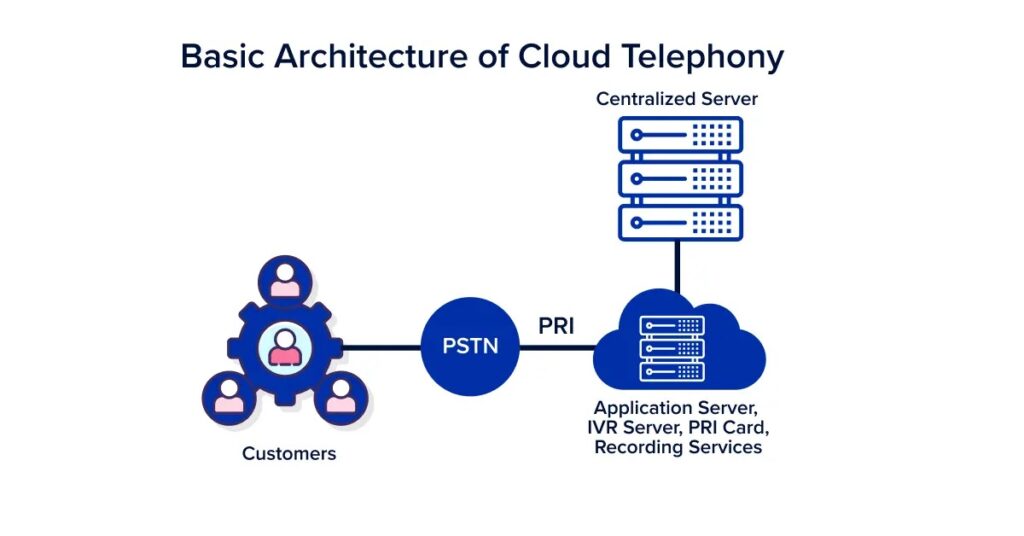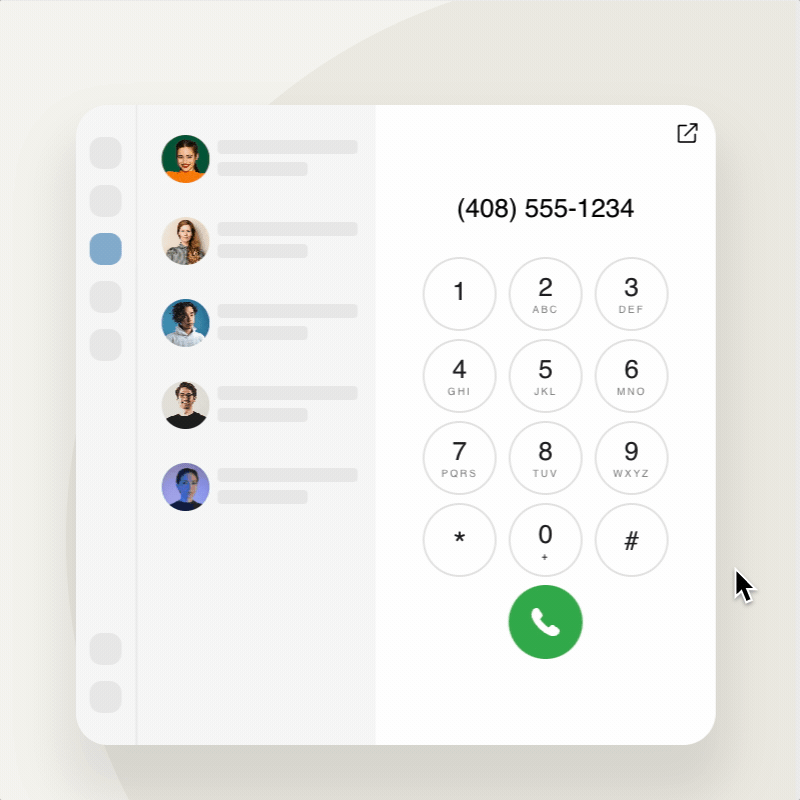In simple terms, Cloud-Based Phone Systems – often referred to as cloud phone systems – operate over the internet rather than through traditional phone lines. Communication takes place on the cloud, which is a network of remote servers that allow for the storage, management and processing of data over the internet.
Cloud-based phone systems derive from Voice over Internet Protocol (VoIP) technology, popularised in the mid-1990s as a low-cost alternative for businesses. The first versions of cloud-based phone systems were then launched in the early 2000s, and have since become more sophisticated, featuring a range of integrations, features and customisation. Today, cloud-based phone systems – such as RingCentral’s cloud telephony service – allows businesses to manage all their communication in one app.
This article outlines how cloud-based phone systems work, how they compare to traditional landline-based and VoIP systems and how they can benefit businesses.
How a cloud-based phone system works

On a practical level, cloud telephony works in the same way as any other VoIP phone service, by converting analogue voice signals into data packets and transmitting them over an internet connection. In the case of cloud telephony, when a user dials a phone number using a VoIP desk phone or softphone, the call is routed by a third-party VoIP service provider.
Cloud telephony eliminates the need to run on-premises, traditional private branch exchange (PBX) systems. For example, you don’t need to manage your own PBX, but rather, your cloud system can be web-based or an application. Cloud telephony works by using an internet connection to enable users to make and take calls from their desktop or mobile handsets. Organisations subscribe or ‘rent’ remote access to a cloud-based phone system provider via the internet, meaning they outsource the management of any complex technology and eliminate the need to house bulky physical hardware on site.
Cloud-based phone system vs VoIP vs traditional phone system
While there are little differences between cloud-based phone systems and traditional phone systems, there are more similarities between cloud-based phone systems and business VoIP systems. In short, not all VoIP systems run in the cloud. What does this mean? Well, VoIP means that calling data and other communications packets travel over the internet and businesses can adopt VoIP technology, opting to either host their system using an on-premises PBX or outsource to a cloud provider.
How do you know if your business needs a cloud-based phone system?
Alongside a breadth of challenges to stay competitive in their markets, small and medium-sized enterprises (SMEs) are more likely than larger competitors to use traditional landline-based phone systems that make them less agile. These systems have limited features, typically offering no more than call forwarding, call waiting and voicemail, and are unable to offer CRM integration or fast access to vital data. Traditional phone line systems can be expensive to set up and maintain, are limited to a physical location and therefore harder to scale up or down and can require more maintenance. Not to mention the additional expense if a business needs to make regular international calls to employees, customers and contractors. This lack of flexibility and scalability is forcing SMEs to look for more cost-effective alternatives.
Advantages of a cloud-based phone system
So how do cloud-based phone systems help businesses? SMEs should not feel torn about this choice; these five factors demonstrate the clear value they offer businesses:
1. Low cost
Because cloud-based phone systems use the internet, cloud-based phone systems can reduce the overall costs of your communications by up to 60 percent. Plus there’s no expensive hardware to maintain, and you receive free automatic upgrades to the system from your provider’s service team.
2. Ease of use
Cloud-based phone systems are easy to use, and offer flexibility to your business and staff. When your team needs to work from home, or on the go, they still need to be able to answer important calls – forwarding desk phones to mobile phones might be a short-term fix, but isn’t sustainable in the long term. With a cloud-based phone system, your team is free to take and make calls – and even join or host online meetings – wherever they are, using any device.
3. Powerful analytics
Cloud-based phone systems also provide more detailed analytics data compared to other phone systems. For example, RingCentral MVP offers a suite of statistics and reports such as: adoption and usage metrics; tracking of company numbers; real-time live reports; LOB analytics that provide historical call aggregation; meetings analysis dashboards; performance reports on KPIs; monitoring of quality of service performance; a rooms and devices tool for administrators to optimise infrastructure management; alerts for customised metrics, and; a report subscriptions feature.
4. Advanced features and integrations
A cloud-based phone system puts you in full control of how your business communicates. In addition to all the features you get with a PBX system, a cloud phone system offers internet fax, voicemail-to-email conversions, and other advanced cloud features. You can combine all your calls, voicemails, video conferences, online meetings, faxes, and team collaborations onto a single, easy-to-use platform. Your cloud phone system can also easily integrate with hundreds of existing business applications including Salesforce, Microsoft, Google and more.
These integrations are supported by a range of other benefits that help your productivity throughout the day, such as call recording, auto attendants, and interactive voice responses.
5. Higher security
Security is another vital factor for why SMEs should consider switching to a Cloud-Based Phone System. As with anything that operates over an internet connection, cloud-based phone systems are susceptible to security breaches. However, this risk can be significantly reduced by using a trusted service provider. RingCentral provides seven layers of security to protect your architecture, data, processes, and workforce and implements updates continuously to keep security solutions as robust as possible. Measures such as SIP trunk endpoint security, firewalls, toll fraud detection, and suspicious activity monitoring and notifications all make this possible. We also recommend customers use a virtual private network (VPN), voice data encryption, and, of course, make frequent password updates.
Disadvantages of cloud-based phone systems
1. Stable internet needed for Cloud-based phones to work
Cloud-based phone systems rely on a stable internet connection to function properly. If the internet connection is slow, unreliable, or interrupted, it can impact the quality of voice calls, and cause delays or dropped calls. This can be a particular problem for businesses that rely heavily on phone communications, as it can impact productivity and customer service.
2. Not suitable for emergency calls
Cloud-based phone systems aren’t ideal for emergency calls. In some cases, emergency services can’t always trace the location of the call accurately, which can lead to delays in responding to emergencies. Additionally, like any system, cloud-based phone systems may be susceptible to outages. For this reason, RingCentral recommends that businesses maintain a traditional phone line for emergency calls, and provide employees with mobile phones, as a back-up.
There is an abundance of reasons for businesses to switch to cloud-based phone systems if they haven’t already. Thankfully, any drawbacks – such as poor internet or suitability for emergency calls – can be mitigated with proper planning and implementation. Start this journey today and manage your calls, faxes, and chats in one app with the RingCentral cloud telephony service.
Originally published 29 May, 2023, updated 14 Jun, 2023





